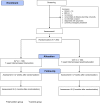Internet- and App-Based Stress Intervention for Distance-Learning Students With Depressive Symptoms: Protocol of a Randomized Controlled Trial
- PMID: 31178770
- PMCID: PMC6537513
- DOI: 10.3389/fpsyt.2019.00361
Internet- and App-Based Stress Intervention for Distance-Learning Students With Depressive Symptoms: Protocol of a Randomized Controlled Trial
Abstract
Background: Mental disorders are highly prevalent among university students. Distance-learning students are particularly burdened and have limited access to conventional university health services. Interventions for stress are sought after in distance learners and may help increase treatment coverage. Internet-based interventions have been shown to be effective in preventing and treating depression, but it remains unclear if interventions directed at academic stress also have this potential. Aim: The trial presented here investigates the effectiveness of an Internet- and App-based stress intervention in distance-learning students with elevated levels of depression. Methods: A sample of N = 200 students of a large German distance university with elevated levels of depression [Center for Epidemiological Studies' Depression Scale (CES-D) ≥ 16] will be randomly assigned to either an Internet- and App-based stress management intervention group (IG) or a control group (CG) receiving an Internet-based psychoeducational program for academic stress. The IG consists of eight Internet-based sessions promoting stress management skills using cognitive-behavioral and problem-solving techniques. A mobile App will be employed to facilitate training transfer. Self-report data will be assessed at baseline (T0), post-treatment (T1; 7 weeks), and 3-month follow-up (T2). Potential moderators will be assessed at baseline. The primary outcome is depression (CES-D) post-treatment. Secondary outcomes include mental health outcomes, modifiable risk and protective factors, and academic outcomes. Data will be analyzed on an intention-to-treat principle along with sensitivity analyses to assess the robustness of findings. Additional health economic analyses will be conducted. Discussion: Results will provide the basis to assess the acceptance and effectiveness of Internet-delivered stress interventions in distance-learning students with symptoms of depression. Ethics and dissemination: The study has been reviewed and approved by the University of Erlangen-Nuremberg ethics committee (Erlangen, Germany; 33_17 Bc). Results of the study will be disseminated through peer-reviewed publications. Trial Registration: German Clinical Trial Registration (DRKS), identifier DRKS00011800.
Keywords: Internet; depression; distance-learning students; mobile app; randomized controlled trial; stress management; telemedicine.
References
Publication types
LinkOut - more resources
Full Text Sources


